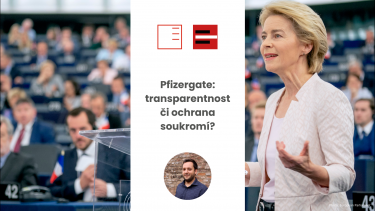RILSA | The uncertain fate of the Green Deal for Europe ahead of the European Parliament elections
Farmers' protests have reminded that the measures of the Green Deal for Europe may not be politically viable for Europeans. To make climate policies politically viable, the EU should therefore focus on its commitment not to leave anyone behind in the green transition. Klára Votavová, a researcher at EUROPEUM Institute for European Policy, discusses the current development of the Green Deal for Europe and its social policy aspects in an expert publication for the Social Policy Forum.
Show moreHospodářské noviny | More than five million people will need to be retrained in the Czech Republic by 2030. Car industry will mainly face the problems
The Czech car industry is lagging behind the rest of Europe and the world. It may not be able to pick what to produce, but it has the opportunity to strengthen its competitiveness and resilience. However, it needs trained and educated employees, which are hard to find on the local labour market. So are we going to train the automotive workforce, strengthen the position of our strategic sector and promote a just transformation? Or are we going to continue to say that the transition to electric mobility does not concern us and that the Green Deal for Europe is to blame for increased unemployment? How to produce electric cars and remain competitive? Rebeka Hengalová, a researcher at EUROPEUM Institute, discusses this topic in her article for economic daily Hospodářské noviny.
Show moreSeznam Zprávy | Europe is buying more and more Russian liquefied natural gas
French President Emmanuel Macron is talking about sending troops to Ukraine, but his country has already sent 600 million euros to Russia for liquefied gas this year. And the country is not alone in this. What do Martin Vokálek and Vít Havelka from the EUROPEUM Institute for European Policy say about this?
Show more

Seznam Zprávy | Evropa kupuje pořád víc ruského zkapalněného plynu
Francouzský prezident Emmanuel Macron sice mluví o vyslání vojáků na Ukrajinu, jeho země ale letos poslala Rusku už 600 milionů eur za zkapalněný plyn. A není v tom sama. Co na to říkají Martin Vokálek a Vít Havelka z Institutu pro Evropskou poliitku EUROPEUM?
Show more

TV Nova | Russian Interference in European Elections
Russia has a significant interest in influencing European elections, which raises awareness in the European Parliament. The issue of Russia's interference will also be addressed in the plenary session. Measures such as restricting visits to the Parliament building or holding events on its premises are being considered. Nevertheless, member states still play a crucial role in foreign and security policy of EU, as commented Jonáš Syrovátka, a researcher at the EUROPEUM Institute, for main evening news broadcast on TV Nova.
Show more
Policy Paper | Securing Europe’s Lithium Future: The Cinovec project and sustainable lithium mining
The EU's proactive stance, introduced in the Critical Raw Material Strategy and later Critical Raw Materials Act (CRMA), drives the EU approach to secure the supply of European/domestic critical raw materials for EV battery production. The Cinovec project has a large economic potential as it enhances the ability to secure domestic and regional supply of lithium, which is otherwise very geographically concentrated outside of Europe. Europe relies on a handful of countries, particularly China, for the import of lithium for the production of EV batteries.
Show morePolicy paper | Zajištění lithiové budoucnosti Evropy: Projekt Cinovec a udržitelná těžba lithia
Proaktivní postoj EU, který představila ve strategii pro kritické suroviny a později v aktu o kritických surovinách (Critical Raw Materials Act - CRMA), je hnací silou přístupu Unie k zajištění dodávek těchto surovin pro výrobu baterií pro elektromobily. Projekt Cínovec má v Česku velký ekonomický potenciál, protože zvyšuje schopnost zajistit domácí a regionální dodávky lithia, které jsou jinak geograficky koncentrované mimo Evropu. Ta je na dovozu lithia pro výrobu baterií pro elektromobily závislá na několika málo zemích, zejména na Číně.
Show moreTN.cz | Two months until the European Parliament elections
The remaining two months until the European Parliament elections in June represent a crucial period for political debate and public discussion. What kind of issues will resonate across Europe? And can we expect a strengthening of nationalist parties? EUROPEUM Institute analyst Vít Havelka commented on the upcoming elections for TN.cz.
Show more
iRozhlas.cz | Pfizergate: Transparency or Privacy Protection?
Recent investigation into the purchase of Pfizer vaccines by the EU has revealed the involvement of Ursula von der Leyen, President of the European Commission, raising questions about transparency and accountability. With the interconnection of several cases, including allegations of undisclosed agreements and legal actions, attention to negotiation processes and financial management within the Commission is increasing. The outcomes of these investigations may influence public trust and future leadership of the EU, highlighting the delicate balance between transparency and privacy protection. Žiga Faktor, Deputy Director and Head of the Brussels Office of the EUROPEUM Institute, offered a commentary for iRozhlas.cz.
Show more
ČT24 | The role of MEPs in the eyes of Czech citizens
Interest in the European Parliament elections remains low, and increased turnout is not expected this year either. The Czech perception of the European Union is partly shaped by political expressions, influencing a rather eurosceptic public perception. Although Czech MEPs have the potential to contribute significantly within the Parliament, the public has only limited awareness of their work and influence. Speculations about future positions within the ECR faction and possible commissioner positions are still premature. Viktor Daněk, deputy director of the EUROPEUM Institute, opened these topics on the evening broadcast 90’ on ČT24.
Show moreStaroměstské náměstí 4/1
Prague 1 - Staré Město
110 00
tel.: +420 212 246 552
email: europeum@europeum.org
https://www.europeum.org







